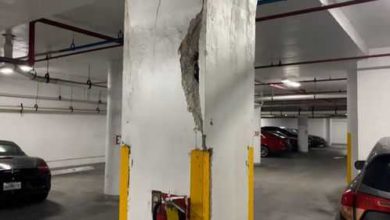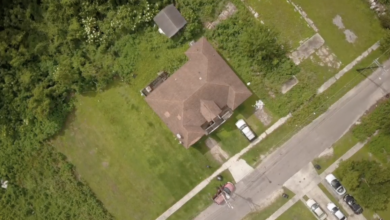
Two former state and federal mining regulators say state and federal authorities should investigate the role strip mining played in last month's devastating and deadly flooding in Eastern Kentucky and the condition of the mines after the torrential rainfall.
The Kentucky counties, and areas of West Virginia and Virginia, flooded by torrential rains have for decades been heavily logged and strip-mined for coal — land-use practices that dramatically alter the landscape and contribute to flooding. The July 28 flooding overnight in Kentucky has killed at least 37 people.
With strip mining, trees are the first to go. Then, hundreds of feet of rock may be blasted away from the tops or sides of mountains to get at underground seams of coal.
“If you get an area that has been strip mined, and the soil has been stripped off, and the upper layers of the soil and rock have been dumped into a valley fill, you have a surface that is not fully vegetated and you get no water retention whatsoever, and that is what causes these flash floods,” said Jack Spadaro, a former top federal mine-safety engineer who works as a consultant for coalfield residents, workers and their lawyers.

Spadaro has been an expert witness in successful flooding lawsuits involving mining companies, and he said he’s seen floods in eastern Kentucky and West Virginia where hydrologists have calculated runoff more than 1,000 times greater after mining than there would have been without the mining.
He said the horrendous scope of the recent Appalachian flooding merits an independent scientific investigation to determine what role mining played in the flooding and what could be done with strip mines to reduce future flood risks.
More news:How coal companies walked away from their 'absolutely massive' environmental catastrophes
“It’s not just mining,” said Davie Randsell, a retired state mining regulator who is from Oneida, Kentucky, in Clay County, which was hit by the flooding. “It all gets mixed together — logging, gas wells, gas well roads, power lines,” resulting in more runoff and the potential for landslides during rain from the scars, she said.
Randsell said at a minimum, Kentucky Energy and Environment Cabinet officials and officials with the federal Office of Surface Mining Reclamation and Enforcement need to check on the condition of the mines, which could pose ongoing safety risks to people who live downstream from them from washouts, landslides or further flooding from damaged water retention ponds.
'Out of control':Sinking coal industry swamps Kentucky with 'zombie' mine violations
Beyond that, she said, a broader study could help regulators determine whether current mining practices and regulations are up to the challenge of climate change, which scientists say is causing heavier, more intensive rain storms.
In fact, the U.S. Army Corps of Engineers, in a 2017 study of the Ohio River basin, predicted that climate change would bring more rain and significantly increased stream flows to a region that includes the coalfields of eastern Kentucky and West Virginia.
That year, its lead author, Kathleen White, told The Courier Journal it was already out of date and that climate change was accelerating faster than expected.

And in 2019, an analysis of the Corps’ streamflow data and satellite images of strip-mined land for Inside Climate News found that the Big Sandy watershed straddling Kentucky and West Virginia had the largest swath of some 1,400 square miles in their study area altered by strip mining ― and was the most threatened by more rain from climate change.
That Kentucky has allowed financially unstable or bankrupt mining companies to fall far behind on reclamation requirements makes matters even worse, Spadaro said. Reclamation is intended to stabilize these highly disturbed mined areas with backfilling, regrading, the removal of so-called “high walls” left behind by blasting, and managing and treating runoff water, which can be toxic.
Without reclamation, he said, “it means they don’t even have any grass planted.”
Kentucky’s state geologist, William C. Haneberg, said research findings have been mixed on whether the valley fills created by some forms of surface mining increase flood risk themselves.
But he said those studies typically assumed normal rain storms. “When you have an event like we just had, all bets are off,” said Haneberg, who also oversees the Kentucky Geological Survey.
Haneberg agreed that a post-storm study makes sense but is not sure how it could be funded.
“It would definitely be something we would like to look into, but we have shrunk over the last few years as the university has cut our budget,” he said.
Research out of West Virginia University in 2020 found that even fully reclaimed surface mines in Kentucky were significantly likely to have experienced landslides. That deserves further evaluation, Haneberg said, adding that the reasons could range from differences in geology, construction methods or enforcement of mining regulations
That peer-reviewed study was by graduate student Miles Reed and co-authored by WVU geology professor emeritus Steve Kite. The findings suggest Kentucky mine sites could be more vulnerable to landslides during rains like the ones that just drenched eastern Kentucky, Kite said. Most of the problems Reed found, he said, involved drainage around the valley fills, such as settling ponds or ditches, which if they break can more easily carry rocks or trigger dangerous debris flows.

Spadaro said the federal surface-mining office should be the agency that leads any study of flood impacts from mining, working with the Kentucky Energy and Environment Cabinet. But he said he doubts they would agree to a collaboration.
“No one at the state or federal levels wants to admit the regulatory agencies have failed to do their duty to protect the people,” he said.
Neither the federal nor state mining agencies would immediately comment, citing time constraints.
“The (state energy) cabinet is wholly engaged right now in delivering relief to the parts of Eastern Kentucky devastated by the recent flooding,” said John Mura, energy cabinet spokesman.
Inside Climate News is a Pulitzer Prize-winning, non-profit, non-partisan news organization dedicated to covering climate change, energy and the environment.
Source link









